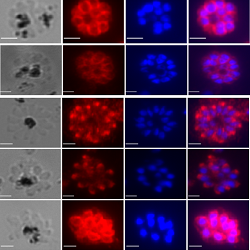
The development of effective vaccines against the Plasmodium parasites which cause malaria is a major, global research goal. There has been recent progress against P.falciparum, but another species, P.vivax, is responsible for a significant proportion of malaria outside Africa.
Publishing in PLoS Pathogens, Dr Duncan Ndegwa and colleagues from Prof. Julian Rayner’s group have identified a number of new P.vivax vaccine candidates using a ‘reverse vaccinology’ approach. They generated antibodies against P.vivax surface proteins previously identified from genomics as potential vaccine targets, and because P.vivax cannot be grown easily in the laboratory, used the related (but more easily culturable) P.knowlesi species to test the antibodies’ abilities to inhibit parasite growth. The researchers also leveraged the genetic plasticity of P.knowlesi by using CRISPR-Cas9 to create P.knowlesi lines in which endogenous genes had been exchanged with their P. vivax orthologues. Several anti-P.vivax candidate antibodies inhibited red blood cell invasion, identifying new prioritized targets for follow up. Prof. Rayner and colleagues aim to use this approach to expand the range of potential vaccine targets, and therefore, the pipeline of candidate vaccines against P.vivax.

